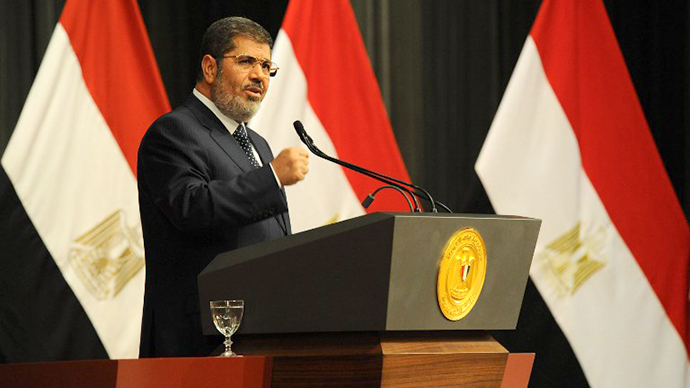‘Moderate Islamist regimes are effectively neoliberal regimes’

Egyptians are calling for President Morsi’s removal from office because a year into his presidency, he has proved that moderate Islamist regimes are essentially neoliberal, journalist and Middle East expert Tariq Ali told RT.
Morsi opponents have called for mass demonstrations on Sunday, hoping to force the leader to step down on the first anniversary of his taking office. The days leading up to the protests have already left several people dead and more than 100 injured.
RT:Do you think the opposition’s calls for Morsi to step down will be heeded?
Tariq Ali: It depends on the extent of the mass mobilizations on Sunday. I think it goes without saying - and Morsi himself has partially admitted it - that he’s disappointed people. He’s disappointed them in terms of economic policy. He promised social justice and change, but nothing is being done. He’s disappointed them in clearing out security apparatus and trying the people who were responsible for atrocities against demonstrators. In relation to Gaza and Palestine, instead of opening the routes to Gaza so that the Gazans’ blockade can be broken, he has gone beyond Mubarak. He’s not just using gas to stop the tunnels from working. He’s using sewage. So a sizable section of those who helped bring Mubarak down believe that Morsi has changed absolutely nothing since he’s come to power. These protests are to show that the democratic fig leaf is not allowed. So what will happen on Sunday, I think, will be quite decisive.
RT:Looking back on Morsi’s year in power, why is there so much discontent over his policies?
TA: I think because he is continuing in the same old way. He has made virtually no changes at all and he’s made provocative suggestions in relation to imposing religious laws. There have been provocative attacks on the Coptic minority in Egypt. This is always the case with Islamists of this type because Morsi’s friend in Turkey is equally in trouble for very similar reasons – even though Turkey’s had sort of a pretty good economic record over the last four years, simply in terms of money. So what we are seeing, effectively, is that these – what are referred to in the western media as moderate Islamist regimes – are effectively neoliberal regimes which have got the backing of Washington and think that because they have done these deals with Washington, they can do whatever they like to their own people. And the Egyptians are now saying, ‘No, you can’t do whatever you want to us. We’re going to resist.’ And in Egypt, having had this sense and very recent memory of mass mobilizations being able to topple the regime, people are feeling very confident. So unless massive oppression is used on Sunday, I think the turnouts will be large.
RT:Opposition activists have claimed that some 15 million Egyptians have signed a petition demanding Morsi’s removal. How split is the country right now?
TA: The country is divided down the middle. Whether
they’ve got 15 million signatures, I do not know. I hope, from
that point of view, that they have. But don’t imagine that Morsi
hasn’t got support, too. Several millions voted for him. So it’s
not that he’s bereft of support - it’s just that the country is
now very, very sharply divided between those who want some
meaningful change and the government, which is maintaining
continuity from the previous regime and in some instances getting
worse.
'Disappointing and unpresidential'
Along with failing to quell the protests, Morsi has also been unsuccessful in restoring the faith of Egyptians nervous about the current bitter polarization and future of the country. His most recent speech described the opposition as “antidemocratic.” Khaled El Shami, editor of Al Quds Al-Arabi newspaper, said the army may help decide Egypt’s fate in the coming days.
RT: Why is so much anger and vitriol being hurled at Morsi by the opposition right now?
Khaled El Shami: I think the reason is that the speech last night was seen by the majority of the Egyptians as very disappointing and rather unpresidential. Even the good or bad points in the speech, particularly when talking about reconciliation or amending the constitution, weren’t taken seriously by anyone in Egypt - including those supporting Morsi. I think this is a man who has lost his credibility and is struggling to keep in office.
RT:Often in Egypt’s politics, the army is a wild factor. Is there a possibility that it could step in and take a role in removing Morsi from power, as many in the opposition have hoped?
KS: I think this is a real possibility, given that the army is already heavily deployed across Egypt. The army has shown that it is capable of maintaining stability and security if necessary. We saw clashes [Wednesday] at Mansura, in which hundreds of people were injured and one person killed. Clashes were seen in Alexandria [Thursday]. So if this is to continue, it will be enough for armed forces to intervene. According to article 194 in the constitution, the army is responsible for maintaining stability and security in the country if needed.
The statements, views and opinions expressed in this column are solely those of the author and do not necessarily represent those of RT.












